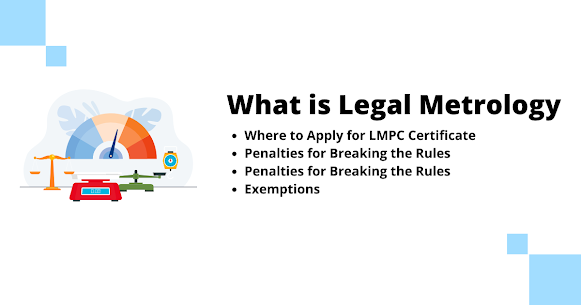What Are Pre Packaged Goods
A pre-packaged commodity is defined as "a commodity that is placed in a packaging of any nature, whether sealed or not, without the presence of the buyer, so that the product contained therein has a predetermined quantity."
What is LMPC Certificate For Importers
Customs may hold your imported products if you don't have an LMPC Certificate or if you don't follow the declaration standards. Make sure your importer registration is completed before your goods arrive in India, given the delays, costs, and other consequences of a customs seizure. As we have discussed that importers who import pre package goods or weighing equipment's etc. must have to draft a application to the director of legal metrology with the full documentations and registration fee such as name and address and if the application get registered by the registering authority (Director of legal Metrology department
) they register the applicant name and issue the LMPC Certificate. LMPC Certificate last for minimum one year and maximum for five years.
Where to Apply for LMPC Certificate
To apply for LMPC Certificate several states have started online portals so people can register from there such as andhra pradesh, delhi and few more. But if your state doesn't have an online registration portal then you can visit your nearest local legal metrology department personally or hire an advocate or maybe take help from third party agents to fill up the registration with required documents.
What is The Procedure for Applying And How Much Does It Cost?
1. You'll need to provide the following information on your application form:
2. Name of the (applicant)
3.Complete address of the location from where the commodity is imported
4.The commodity's common or generic name
The application must be submitted within 90 days of the start of importation, according to the requirements. A fee of INR500 will be charged.
The registering authority will visit the importer's premises after receiving a completed application form and, if everything is in order, will register the applicant and issue an LMPC certificate. This can take up to 20 days in most cases.
Within seven days of receiving the application, if it is incomplete, it will be returned to the applicant.
By paying a charge of INR100 to the registering authorities, the importer can make changes to the certificate.
Penalties for Breaking the Rules
A fine shall be imposed for any infringement of the Legal Metrology (Packaged Commodity) Rules:
The fine is INR4,000 if any of the stipulations of regulations 27 to 31 are broken.
The fine is INR2,000 for violations of other sections of these rules for which no punishment is stipulated in the Act or Rules.
You will be charged a late fee if you request for an LMPC certificate after 90 days from the date of importation (INR5,000 in Delhi)
If it is not a first offense, the fines may be accompanied by some type of action. Typically, the manufacturer is held responsible. If the qualifying words manufactured by' or 'packed by' do not precede the name and address of the business mentioned on the label, it is assumed that the name and address belong to the manufacturer, and culpability will be established accordingly. Importers should be aware of this because they may be held accountable for any infringement.
Exemptions
All pre-packaged items, with the exception of the following, require an LMPC certificate for importation:
Commodities with a net weight or volume of less than 10 grams or ten milliliters
Agri-products in bundles weighing more than 50 kg
Packages comprising fast food items that have been prepared by a restaurant or a hotel.
Packages containing formulations that are subject to the 1995 Drugs (Price Control) Order
Furthermore, the provisions of Chapter 2 of the Legal Metrology Act that apply to packages intended for retail sale will not apply to:
Packages containing greater than 25 kg or 25 liters of goods, excluding cement and fertilizers offered in 50 kg bags
Industrial customers (those who acquire goods directly from the manufacturer for use in that business) and institutional consumers are packaged commodities (service institutions such as airways, railways, hotels and hospitals).

Thanks for sharing informative blog with us. Keep visit website to know how to get LMPC Certification
ReplyDelete